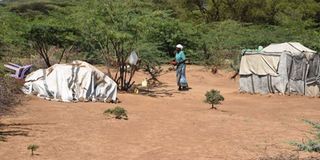Premium
Displaced Baringo families cry for aid

A woman displaced Lake Baringo floods outside her tent at Uwanja Ndege in Marigat.
What you need to know:
- They have no option but to pack themselves and their families into tiny, unhygienic old-gunny-sack tents.
- Some of the worst-hit villages are Loruk, Noosukro, Kokwa Island, Kampi Samaki, Sokotei, Lorok, Kiserian.
- Ms Koyala has been on the move since 2010, when floods pushed her family away from Maasai village.
- Between 2017 and 2018, the Kenya Red Cross helped the flood victims set up new houses.
As she dutifully stirs porridge under a shrub at Uwanja Ndege makeshift camp, Ms Jackline Koyala cuts the forlorn image of someone on the verge of despair.
Her one-year-old daughter, whom she clutches snugly in her arm, lets out an impatient shriek for probably her first taste of food in many hours.
Ms Koyala, 38, is among 4,000 people who are living in deplorable conditions after being displaced from their homes by Lake Baringo’s rising water levels.
They have no option but to pack themselves and their families into tiny, unhygienic old-gunny-sack tents at Uwanja Ndege, Noosukro, Kiserian and Sokotei villages, after their houses were swallowed by the rain-swollen lake.
Among the worst-hit villages are Loruk, Noosukro, Kokwa Island, Kampi Samaki, Sokotei, Lorok, Kiserian, Ruggus, Loitip, Mukutani ndogo, Ng’ambo, Sintaan, Salabani, Loitip, Ilng’arua, Loboi and Longeiwan.
Ms Koyala came to Uwanja Ndege in May.
Few utensil from Red Cross
She was among the more than 100 households that shifted from the flood-prone Ng’ambo and Loropil villages in Baringo South sub-county, after their houses and farms were submerged in the ever-swelling Lake Baringo, rendering them paupers.
She casts a glance at three of her seven children, who have developed distended bellies and dry skin due to malnutrition.
The three keenly observe their mother’s every move, a clear indication that they too are ravaged by hunger.
Tragically, before she is done preparing breakfast, a whirlwind sweeps across the wind-swept and heavily congested camp, blowing dust to the contents in the cooking pot, the only meal for her children.
She, nonetheless, goes ahead to serve the porridge.
Ms Koyala has been on the move since 2010, when floods pushed her family away from Maasai village next to the lake.
“This was my fifth time of being displaced by floods. I first moved from my home area in 2010 when River Perkerra burst its banks, submerging most of the homes and forcing us to relocate to safer areas. I got five of my seven children while living in temporary camps,” Ms Koyala said.
She says lack of food, clothing and proper shelter has exposed children, the elderly and expectant mothers to cold-related illnesses.
“I did not salvage anything, save for a few utensils and a tattered tarpaulin tent I was given by the Kenya Red Cross three years ago,” the distraught mother said.
Between 2017 and 2018, the Kenya Red Cross helped the flood victims set up new houses.
Blessing short-lived
However, the blessing was short-lived as most of the houses were swallowed up by flood this year. They are now five kilometres inside the Lake.
“I do not know my next move, as we depend on well-wishers and government agencies for survival. We have reached a point where you are privileged and have to thank God if you get a single meal,” she said.
It’s the same story for Ms Nongisho Kusele, a mother of five.
Though she got a new tent from the Red Cross in 2018, it was very small.
She could not even stand inside the one-and-a-half-metre-high enclosure.
“Four of my children sleep on the bare floor while I use the improvised bed with my one-year-old son. Most of the time we are rained on as the water drains into the tents,” Ms Kusele told the Nation team.
The Nation found Ms Napunyu Lekesio’s five-year-old grandchild shirtless, with an old, tattered pair of shorts as the only clothing covering his body.
Looking frail and coughing endlessly, the boy lay on a mat under a tree to shelter himself from the afternoon’s scorching sun.
Sleeping on the cold floor with no bedding has made children to contract serious bouts of common flu due to the biting cold and crowding.
A spot check by the Nation on Wednesday last week revealed that men and other adults are spending their nights outside so that women can sleep with the younger children in the tents.
Women have given birth in these unsavoury conditions, posing a health risk to babies.
Snake bites
Ms Jackline Olekidogo, a mother of four, revealed that some women are struggling because their breasts cannot produce milk.
The myriad problems at the internally displaced people camps have been aggravated by snake bites, lack of latrines, clean water and mosquito nets.
The residents, who are also prone to banditry attacks, have been forced to clear thick bushes in abandoned villages so as to resettle their families.
Lake Baringo has risen from 236 square kilometres in 2015 to approximately 260 square kilometres.
According to Lake Baringo senior warden Jackson Komen, the water body has increased by more than 80 per cent since the onset of the current rains.
The lake is expanding from all sides daily because the rivers feeding it, including River Molo, Perkerra, Ol-Arabel, Mukutani and Endao, are completely swollen.





